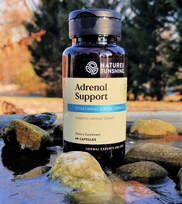
Adrenal Support
Stock #1507 (60 capsules)
- The powerful blend of vitamins, minerals, enzymes, and adaptogenic herbs synergistically support vital adrenal functions.
- Helps maintain adrenal function.
- Supports a healthy balance of stress hormones.
How it Works
Certain hormones in the body—called stress hormones—prepare the body to deal with stressful situations by increasing the heart rate and the force of contraction and blood flow to the heart, liver, and to skeletal and adipose tissue. These stress hormones are produced and regulated by the adrenal glands. They also dilate airways to the lungs and increase blood levels of glucose and fatty acids. The adrenal hormones and their functions are linked to virtually all of the body systems. Thus, many physiological processes and bodily functions, including cardiovascular health, sex drive, pH balance, skin conditions, energy levels, mood and overall psychological outlook often correlate to adrenal gland function. Adrenal Support is formulated with a unique adrenal glandular substance plus a synergistic blend of vitamins, minerals, enzymes and adaptogenic herbs that help support adrenal gland function.
Why Our Adrenal Support?
Adrenal Support combines a synergistic blend of adaptogenic herbs, vitamins, minerals, and enzymes with adrenal glandular substance to fortify the adrenal glands and bolster their function. As stress hormones produced in the body are regulated by the adrenal glands, it is important to provide a potent combination of ingredients to fuel their healthy function. Our superior adaptogenic herbs deliver neuroprotective properties, helping to provide natural support and balance to the nervous system, as well as help support a healthy balance of stress hormones in the body to ensure mental equilibrium and overall comfort.
The Story Behind Adrenal Support
Recognized as an element in 1755, magnesium was first isolated in 1808 by Sir Humphry Davy, an English chemist. Though it can be extracted from various minerals, magnesium is often obtained from seawater. In the 1930s, Hungarian chemist Albert Szent-Györgyi discovered and named ascorbic acid, which literally means “anti-scurvy.” Many sailors had suffered from scurvy on or after long sea voyages without access to fresh produce. Later Szent-Györgyi discovered rutin, a bioflavonoid nutrient that supports vitamin C’s activity. He won the Nobel Prize for Medicine in 1937 for his discovery and his description of oxidation. American biochemist and two-time Nobel Prize winner Linus Pauling studied scientific literature on vitamin C and became a true advocate for this nutrient, penning Vitamin C and the Common Cold in 1970. Ancient Greeks and Romans used licorice root for health benefits. Traditional Chinese Medicines relied on licorice to provide respiratory, digestive and reproductive system support. Widely used in Traditional Chinese Medicine, schisandra is known as the five-flavored fruit. Possessing a remarkable taste that is sour, sweet, bitter, salty and pungent, it has been used for centuries for its adaptogenic benefits.
Recommended Use by Nature’s Sunshine
Take 1 capsule with a meal twice daily.
From HART NSP Master Reference by Laura Clement, BA, CNHP
The adrenal glands play a critical role in the regulatory mechanisms that assist the body in adapting to stress. Prolonged stress—whether resulting from mental and emotional upset or due to physical factors such as chemical exposure, excessive exercise, malnutrition, sleep deprivation, surgery, or numerous other environmental causes—results in measurable changes in hormone levels and enzymes, as well as cardiovascular, immune and gastrointestinal functions. These systemic changes significantly contribute to many stress-related health problems, including the development of hypertension (high blood pressure) and atherosclerosis, insulin resistance, certain immune function disorders, and even deficits in memory and mental processes. Fortunately, animal and human research has identified a variety of nutritional and botanical substances that regulate and enhance the body's ability to respond to stress and may help prevent stress-related illness.
Adrenal Support contains a wealth of nutrients that are necessary for healthy adrenal gland function. Adrenal Support provides important vitamins, essential minerals and adaptogenic herbs that help improve the body’s ability to handle stress, protect against stress-induced oxidative (free radical) damage, enhance immune and nervous system functions, and combat stress and fatigue. Adrenal Support also contains adrenal glandular substances that provide additional nutritional factors to nourish and strengthen the adrenal glands. Adrenal Support contains:
Vitamin C is an important anti-stress antioxidant and vital nutrient for adrenal function. Vitamin C is more highly concentrated in the adrenal cortex than in any other organ, and when the adrenals are under stress, vitamin C levels are depleted. Experimental and clinical evidence suggests that supplemental vitamin C in levels significantly greater than the RDA (recommended dietary allowance) can support adrenal function and decrease high cortisol levels—elevated cortisol levels suppress the immune system. Likewise, animal research has shown that megadoses of vitamin C (equivalent to several thousand milligrams in humans) significantly reduces stress-hormone levels and other indicators of emotional and physical stress, including adrenal gland enlargement and changes in the thymus and spleen. Furthermore, vitamin C has been shown to improve the ability of the adrenal glands to adapt to surgical stress in lung cancer patients.
Thiamine (vitamin B1) acts as a coenzyme in the conversion of glucose into energy. Experimental and clinical results have demonstrated the effectiveness of thiamine in protecting the adrenal glands from functional exhaustion secondary to surgery. In addition, positive results of experimental and clinical studies have shown that supplementation of thiamine in doses much higher than the RDA can support adrenal gland function. Furthermore, thiamine is essential for healthy nervous system function and has been termed the "morale vitamin“ as a result of its beneficial effect on mental attitude. For example, 4 double-blind studies demonstrated an association between improved thiamine status and elevated mood, while a study of 120 young adult females found that improvement in thiamine status correlated with reports of participants being more clear-headed, composed and energetic—these results were demonstrated in participants whose thiamine status was "adequate“ according to traditional standards.
Riboflavin (vitamin B2) is essential for endocrine health and functions as a necessary component in the metabolism of carbohydrates, fats and proteins for energy. Riboflavin also plays a role in maintaining glutathione, one of the body’s most important antioxidants. Glutathione protects the adrenal cortex against a large number of toxic chemicals. Consequently, depletion of glutathione contributes to the development of chemically-induced adrenocortical necrosis (the death of adrenal cortex cells). Thus, riboflavin deficiency can result in enhanced oxidative stress, as well as a lack of stamina and vigor, due to mitochondrial dysfunction (disrupted energy production).
Vitamin B6 (pyridoxal-5-phosphate) is essential for growth and maintenance of nearly every body function. Vitamin B6 is necessary for the conversion of tyrosine (an amino acid) to dopamine, an adrenaline precursor. In addition, vitamin B6 is vital for normal adrenal function—experimental and clinical studies show that vitamin B6 supplementation in doses significantly higher than the RDA support adrenal gland function. Furthermore, vitamin B6 status significantly affects the production of neurotransmitters such as serotonin and GABA, which control anxiety, depression and pain perception. Unfortunately, human studies indicate that the bioavailability of vitamin B6 from natural food sources is limited. Vitamin B6 is converted in the liver into pyridoxal-5-phosphate (PLP), the metabolically active form of vitamin B6. Individuals with poor liver function may not be able to adequately convert "inactive“ forms of vitamin B6 (such as pyridoxine hydrochloride) into PLP.
Pantothenic acid (vitamin B5) - A close correlation exists between tissue levels of pantothenic acid and the functioning of the adrenal cortex—animal studies show that pantothenic acid is highly retained in the adrenal tissues. Pantothenic acid participates in nerve transmissions and in the production of adrenal hormones that control the body’s reactions to emotional and physical stress and the "fight-or-flight response.“ Pantothenic acid can also improve the body’s ability to withstand stressful conditions. Based on animal and human trials, pantothenic acid supplementation is important in order to maintain adequate levels in individuals under stress—evidence indicates that adrenal cortex function is compromised when there is a deficiency of pantothenic acid derivatives and metabolites. Furthermore, pantothenic acid deficiency can lead to adrenal atrophy, characterized by mental depression, fatigue, headache, sleep disturbances, abdominal discomfort and nausea, and motor nerve dysfunction.
Magnesium demonstrates a protective effect against stress-induced physiologic damage. Research has shown a negative correlation between magnesium balance and oxidative stress—chronic stress or injury reduces magnesium levels and simultaneously increases the intensity of oxidative stress upon the body. Magnesium deficiency also increases the risk of stress-induced cardiovascular damage. In addition, magnesium deficiency has been shown to impair vitamin B6 status. Furthermore, animal studies have found that magnesium deficiency decreases specific immune response and accelerates the progressive degeneration of the thymus.
How to Order
- Order directly from Nature’s Sunshine at the following link: https://www.naturessunshine.com/product/adrenal-support-60/
- Contact our office at 530-878-1119 or [email protected]


 RSS Feed
RSS Feed



